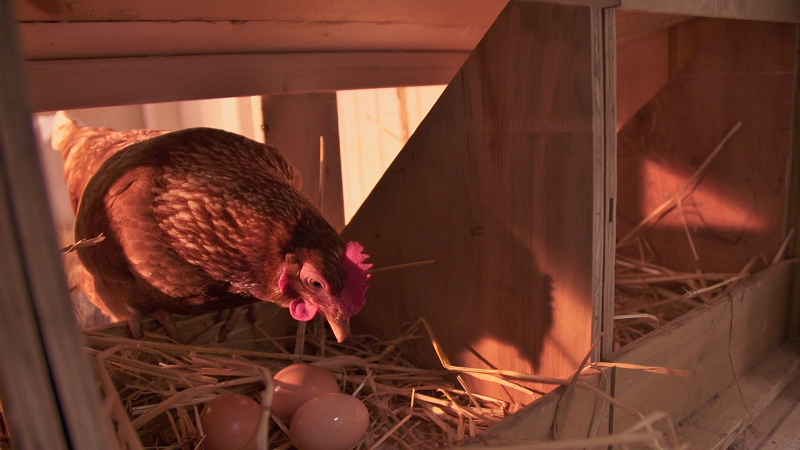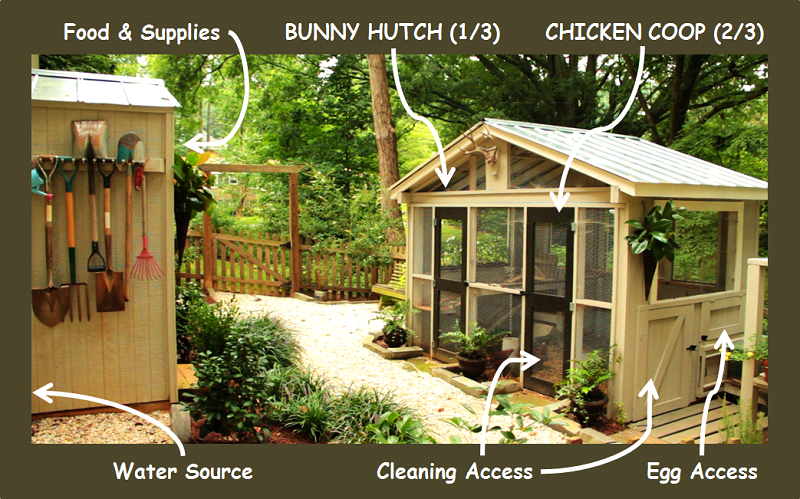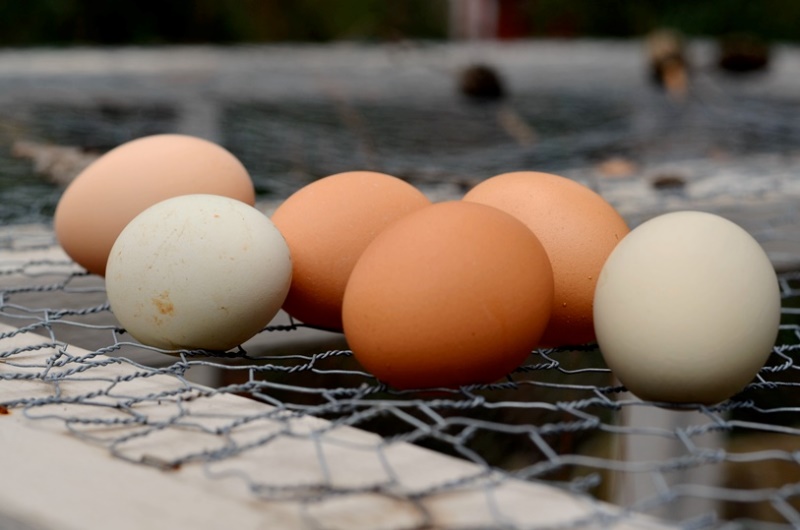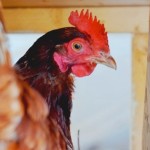The Real Truth about Raising Backyard Chickens
When I first started raising backyard chickens I really knew next to nothing. I knew what I wanted to get out of raising chickens, but beyond my vast experience at raising parakeets as a kid (which didn’t help much at all…surprise), I didn’t have a clue.
Now, after having a whopping 1.5 years of experience as a “chicken farmer”, I have learned a few interesting things about raising chickens that have allowed me to hold the floor a few times at dinner parties. Here are some of those things I often share that seem to receive the most “ah-ha” moments from our friends and family…or at least an animated reaction.
1. You don’t need a rooster to have farm fresh eggs.
This is definitely the fact that has gotten the biggest reaction when I’ve had a willing audience. [Warning…I’m probably about to cross the line of appropriate sharing for some of you – but for reasons of education, I must.] Yes…to get fertilized eggs you need a rooster. But to just get eggs, all you need is a hen. Although baby chicks do hatch from eggs…hens are not actually giving birth to a chick. They are simply passing (i.e., laying) an egg. Like humans and other animals, hens ovulate. Hens, however, ovulate every 25-26 hours (with some variation depending on the breed and the time of year). If you had a rooster your hens could very likely lay fertilized eggs, but Mr. Rooster is not required for the ovulation process…only the fertilization process. Once you think about it, it’s pretty simple biology really.

2. Chickens won’t disturb your neighbors.
Now this won’t be true if you have a rooster. Roosters don’t just crow in the morning…they crow whenever they want, throughout the day. This is why local ordinances, particularly in residential areas, limit the number of roosters you can have…or not allow them at all. They are considered too loud…for obvious reasons, if you’ve ever been close to one when he has crowed. And now that you know that roosters aren’t required for hens to lay eggs, most of us backyard chicken folks are good with that…as are our neighbors.
For us Scotts, our 7 hens aren’t noisy at all…and they are clearly a lot quieter than our neighbors’ dogs! And actually, beyond hearing a few loud clucks when they are laying their eggs or when they are alarmed while free-ranging, you would really never know we had chickens. When you get close to their coop you can hear them clucking or making muffled bawking or cooing sounds, but I think those sounds are actually quite pleasant.
3. Chickens are not difficult to take care of.
Now this fun fact is less of a fact and more of an opinion. Yes, care for your chickens is definitely required…but I have found that it doesn’t require that much work at all. That said, in order to minimize the amount of work required to raise chickens you need to think through the living requirements of your flock.
Essentially all chickens do is eat, poop, scratch, drink, preen, take dirt baths, and poop some more. So these realities are important to consider when determining the location and design of your chicken coop. Your coop should be convenient enough for you to get to fairly often…at least once daily to check on their food and water and to retrieve your eggs. Near your coop you should have easy access to their food, a water source, and any other chicken-related supplies and coop-cleaning tools. You should think through how and where you will dispose of all the chicken poop and the old pine shavings (or whatever you put on the floor and in the nesting boxes)…e.g., compost pile. In the design of the coop itself, you either need to be able to physically get far enough into it or have easy access to the entire structure if it’s a smaller coop…to clean it out (which I probably do only about every 3-4 months… taking about an hour); and you also want to have easy access to the eggs. I would suggest being able to access the eggs from the outside (i.e., you don’t want to have to enter the coop every time you want to get your eggs…it can be a bit messy…remember they poop all day long!).

Lastly, it’s really easy to find friends or neighbors to check on your chickens when you go out of town…largely because you can pay them in fresh eggs! And all they really have to do is “check” on them – i.e., make sure they have food and clean water. They don’t need to be walked or anything else so it really just takes a few quick minutes to stop by for chicken-sitting. Although, because chickens are quite entertaining they will probably stay longer. We often will get pics texted to us of our fleshy friends playing with our feathered friends.
4. There is such a thing as green eggs…that don’t require food coloring.
Yes…there is such a thing as green eggs…and blue eggs and olive eggs and chocolate brown eggs. Besides the shell color, they look no different once you’ve cracked them open (see below for more on yolk color…and yes, it’s yolk, not yoke – which is the wooden bar you put across the necks of two work animals). The color of the egg’s shell depends on the breed of the chicken that laid it. Then within the breed, there may be some variation within that color by chicken. But a single chicken will lay eggs of a fairly consistent color. Think of it in terms of eye color, different genes carry different eye color. Likewise, the genes of a chicken determine the color of their eggs…and breeds of chicken are essentially differentiated by what genes they possess.
We have 3 breeds of chickens: Barred Plymouth Rock (2); Easter Egger (2); and Golden Comet (3) – which is actually not a breed, but a sexlink hybrid between 2 breeds – mine are from a male Rhode Island Red and a female Rhode Island White. (Click here to read more about sexlink chickens.) So we effectively get eggs of 3 different colors.
- Our Barred Plymouth Rocks (Henny and Polly)lay pale brown, almost pink eggs.
- Our Easter Eggers (Marigold and Hazel) aptly lay pale green eggs. Easter Eggers have not been recognized as an official breed, but they are one of the most popular chickens to have in a backyard flock due to their laying eggs of more unusual colors. Although ours lay minty green eggs, other Easter Eggers may lay darker green eggs or blue eggs…and some will lay dark olive eggs.
- Our Golden Comets (Ginger, Mazie, and Meribeth) lay brown eggs – similar to the color you would find in brown eggs you buy from the store.
 Now, the color of an egg’s yolk may be different as well…but all within the yellow to orange range. This, however, depends on the chicken’s diet. If you feed your chickens feed made up of more or less colorless corn and other grains and fillers, their yolks will be pale yellow. But if you let your chickens free-range, where they have access to proteins and plants that have brighter or darker pigments their yolks will be bright yellow to almost orange. This color variation has to do with a chicken’s diet, not their breed.
Now, the color of an egg’s yolk may be different as well…but all within the yellow to orange range. This, however, depends on the chicken’s diet. If you feed your chickens feed made up of more or less colorless corn and other grains and fillers, their yolks will be pale yellow. But if you let your chickens free-range, where they have access to proteins and plants that have brighter or darker pigments their yolks will be bright yellow to almost orange. This color variation has to do with a chicken’s diet, not their breed.
So there you have it…some interesting tidbits I’ve learned about chickens since raising them. In the weeks to come I’ll post more on the design of our coop, how you should store your eggs, if you should wash your eggs or not, and other chicken-raising-related topics. So stay tuned.
For those of you who raise chickens, what other fun facts have you entertained your friends and family with?
For those of you who don’t, what questions do you have about raising chickens? I’d love to de-mystify anything for you.
You may also enjoy these posts from RYG ...
If you're not already subscribed to RYG and want to get periodic updates, links to new posts & other ground redeeming info ... just enter your email address below. Easy as that!







Nice article. I think that I want my own coop someday. What do you do with the extra eggs ?
Thanks Dale! We really do love having chickens for so many reasons. As for the eggs…we really do eat the heck out of them. On occasion we’ve given eggs to friends…but we’ve really not had a ton of extras. That said, w the addition of our 2 Easter Eggers (replacing our 1 Cochin..RIP)…who are great egg layers, we’ll probably start to have extras this Spring/Summer when their egg production gets back in full swing. Thanks for your comment Dale. Take care, D.
sell them
I am quite fascinated by yard birds! I’ve been thinking waaay later down the road, I’d love to have a coop and a little flock of hens. This answered so many questions. I’ve always wanted an Easter Egger and maybe a couple of Silkies! Thanks for sharing your knowledge… keep it up!
Thanks B! Just let me know when you’re able to take the jump into raising chickens. Glad the post was helpful. We had a Silkie…was one of the 2 “cockerels” who were supposed to be “pullets”…so once HE started crowing Lily become Lyle and we gave him to a friend who could have and wanted a rooster. Silkies truly are funny birds…and their eggs are not very frequent or not much to speak of. Regardless, chickens are great fun to have. Take care, D.
did you know that if you feed your chicken corn one day, then foods that are red the next day, then foods that are purple the next day etc…when you hard boil the egg and slice the yolk, the yolk will be yellow, red, purple etc.
Leslie: I did not know that. Very interesting. Have you done this with your own chickens…or seen it yourself? I’d love to know more if you have any information you could share. I would imagine that they would have to eat very large amounts of food to affect it that much. But as I write this I wonder…but my chickens eat mostly green and brown things found in my yard…and all that has done is make their eggs brighter yellow or orange, i.e., not green or brown. Again, I’d love to learn more if you have any additional information to share. Thanks, D.
Have you had any encounters with predators? I’m curious how many backyard critters might try to steal a chicken or two.
Cheryl: That’s a great question and one that I worried about quite a bit. I’d like to say that we haven’t had any problems with them…but that’s not the case. That said, the predators I worried about have not been the predators we’ve had a problem with. We live between 2 streams and behind a dried up pond…coyotes preferred means of getting around. Ever since we’ve lived hear we’ve heard and seen quite a few coyotes. So when we got our chickens I was certain we would have a pack of them licking their chops every day just outside our fence. But that hasn’t been the case. Actually it seems we’ve seen and heard fewer coyotes.
On the other hand we have had 1 bad incident with what we believe was a raccoon, possum, or feral cat. About a year ago I started allowing my flock to free-range in our backyard whether I was home or not. One rainy day I was away from home for a few hours to come home to a brutal scene. 4 of my 6 chickens at the time were cowered in the coop (1 of which had been swiped)…and the other 2 had been killed. One laying just outside the coop and the other wedged between the pickets of our fence. Their bodies were fully intact, but their heads had been eaten (sorry to be graphic…but that’s all part of having chickens…being ready to have discussions about life and death with your kids…a good thing I think). Anyway, we believe that they were attacked by something smaller…otherwise they would have taken all the chickens. If it were a bird they would have tried to go up with them and not squeeze them between the fence. Also, coons are known to eat chicken heads first.
The lessons (for us at least): 1. only let them free range when someone is home and aware that they are outside; and 2. I don’t free-range them when it is overcast/rainy. On overcast/rainy days, those smaller varmints are out and about more…AND with the sounds of the rain the chickens’ sensitivity of what’s around them is hindered.
I have noticed a time or 2 something small trying to dig into the coop at night. But we constructed the coop and the run in a way that nothing could get in…base of both are dug into the ground…and then hardware wire was laid about 10 inches down and then covered with dirt…so really nothing could dig under and then back up. Make sense?
Thanks for your question my friend. I hope this helps. Let me know if you have any other questions.
Take care, D.
What, if any, special accommodations did you need to make during our recent ice/snow storms? Was this a non-issue? Also – what about other domesticated animals? How do hens, though safely separated, react to having a dog barking in the yard?
Leigh…these are both great questions. Let me try to answer them as best I can…
“What, if any, special accommodations did you need to make during our recent ice/snow storms? Was this a non-issue?”
In a nutshell, it is not as much of an issue as you would think. The one thing you really have to watch out for has to do with the low temps, not the ice or snow. Whenever it gets below freezing you need to make sure that they have fresh (non-frozen) water. You can either go back and forth throughout the day OR if your coop has electricity you can use water warmers. Since our winters aren’t that cold here in Atlanta I just go back and forth on those days that are persistently cold.
As far as the low temps and their keeping warm…that’s really a non-issue. Just consider the fact that little sparrows survive winters just fine. As long as they’ve been able to adjust to the colder temps as our days have gotten colder your chickens should be fine. That’s why some say you shouldn’t use a heat lamp to keep their coops warm. Their thinking is that if something were to happen to the heat lamp during a really cold night, then you would be putting the chickens in danger…because their bodies hadn’t adjusted to the cold.
The one thing I’ve been told you do have to watch out for is wind…making sure that they have a place to get out of it. Otherwise you risk their wattles and combs getting frost bite. Again, since we don’t have very cold winters I haven’t really concerned myself with this. That said, Britt and I have fashioned curtains…almost like Roman shades, to draw down over the many open areas of our coop on extra cold or windy nights.
“What about other domesticated animals? How do hens, though safely separated, react to have a dog barking in the yard?”
I can’t really speak from experience on this one…well at least not really. We don’t have dogs so it’s not a real issue…but our neighbors do – just beyond our fence. And they do bark. But they seem to not pay them much attention…if a dog starts barking they’ll just go to another part of the yard – much like I would.
I have other chicken-raising-friends who have dogs, and although there are stories of the dog initially attacking the chickens…it seems that at some point they all get used to each other to the point that the dog will stand guard for the chickens and the chickens will follow the dog around. So I guess it’s all about the introduction process. Now if you had a hunting breed who actually actively hunts, I don’t think you could do much about reversing their DNA and life experience. But that’s just a guess.
Hope this helps…thanks for your questions…keep’em coming.
Take care, D.
Great post doug! Our goal is to build a chicken house this spring. We just have to decide where to place it and find the time to build it. We need to get yall back to grove hill farm soon! Love everything yall are writing on blog…so creative!
Jackie: Thanks so much! Would love to come back to Grove Hill Farm whenever you say the word. We can think through your coop while we’re there. I know 3 little ladies who would be ALL over that! Take care, D.
Chickens are so easy and fun! Good post for beginners! I absolutely love your back yard area. It looks like something out of a magazine! So inspiring.
Sarah: Thanks for chiming in and your encouraging comments. We do love our chickens and really don’t find them difficult at all to take care of. That said, we’re always outside and doing something here and doing something there doesn’t seem like that much to do; however, I have friends who I know would find taking care of chickens unbearable. Kind of like how I would find taking care of their little poof-dog! Different strokes…right? Thanks again Sarah…hope you come back to RYGblog often and enter back into the discussion. Take care and I hope you have a nice weekend, D.
hey there! I’m considering getting a few chooks but I have a few questions about it, just wondering what your views are based on your experience. How many is a good number? I’ve been told you need at least 2 chickens as they’re social. I wonder if 2 is ok, or do you recommend more? Vermin: is it the case that chicken coops always attract mice or rats? How do you manage this? Is there a way to avoid them? Will chickens scratch up your garden too much – as in wreck grass etc? If they have access to a whole garden with varying features (grass, veggie patch, garden beds, paved areas) will they roam through all of it fairly evenly, or will they focus on a certain area and scratch it up till it’s bare dirt then move on? How long per day should they be out? And lastly, is there a breed that is best suited to breng around kids? thank you !
Hey Astrid…thanks so much for checking out RYGblog and for reaching out with your questions. I love hearing about other folks considering raising backyard chickens. And hearing from someone from Australia…well that just seems really cool to me. Anyway…you have a ton of questions…so let me see what I can do. [But before I forget…I wanted to mention that I’m in the process of pulling together a little eBook of sorts on what my family and I have learned about raising chickens…much of which is already on RYGblog, but several folks have mentioned that it would be nice to have it all in one place…and easily printable. So be looking for that in the next week or so.]
How many is a good number? I’ve been told you need at least 2 chickens as they’re social. I wonder if 2 is ok, or do you recommend more?
We have 7…well, one just died, so today we have 6. 1. Maximum #: The first consideration is to establish what the max # you can have. Given the restrictions where we live (based on the size of our property), we can only have 7…so that’s our top #. 2. Amount of Eggs: Many people start out by asking how many eggs they want. An average chicken lays 5 eggs/week. So you can back into the # of hens you get by how many eggs you want. Note, however, some breeds lay more than others…so do your research. We have Comets, Easter Eggers, and Barred Plymouth Rocks…and they are all average-good egg layers. You also need to consider seasonality. Assuming you don’t put a light in your coop, when the temps drop and days get shorter, hens lay fewer eggs. So you may want to throw in an extra hen or 2 to compensate for that; 3. Social Creatures: Lastly, chickens are social creatures, so I’d really never recommend having a solo chicken. So your having 2 is good, but I’d say 3 or 4 is better. It’s actually quite cool to watch them establish and maintain their “pecking order”.
Vermin: is it the case that chicken coops always attract mice or rats? How do you manage this? Is there a way to avoid them?
Mice and rats are attracted to food…wherever they can find it. So I’d simply suggest that you keep your chicken food stored in a tightly sealed container. I transfer my chicken feed into plastic storage bins as soon as I get it…rats less likely to eat through plastic than wood (and actually less likely to chew through metal than plastic). Keeping your coop clean should also help. If you give them your table scraps earlier in the day, anything a rat or mouse would want would likely already be consumed by your chickens by the end of the day when these nasty rodents make their night-time rounds. I’ve heard that some folks take in their chickens’ waterers and feeders at night…which is fine by the chickens, because they are sleeping. I haven’t had a rodent problem, so I haven’t had to go to those extremes. Lastly, you can also help keep rodents out of your coop and run if you use hardware cloth vs. chicken wire. Rats and mice can chew threw the thinner chicken wire.
Will chickens scratch up your garden too much – as in wreck grass etc?
Yes, chickens will scratch up your garden…that’s what they do all day long…scratch, eat, poop, scratch, eat, and poop some more. But depending on what else they have to munch on, they may or may not destroy your grass. My ladies pretty much leave my grass alone…I guess because they have “greener pastures” elsewhere…to your point below.
If they have access to a whole garden with varying features (grass, veggie patch, garden beds, paved areas) will they roam through all of it fairly evenly, or will they focus on a certain area and scratch it up till it’s bare dirt then move on?
Again, they scratch and eat all day long. They will less likely decimate a single area if they have variety, but there are plants that they like more than others…typically those in easy reach and those with more tender leaves. Mine love my ground covers (e.g., creeping jenny) and seem to be fascinated by those things that dangle at or just above eye-height (e.g., vinca underplanted in containers). So you may end up needing to make different plant selections in your garden or put a fence around what you don’t want them to eat OR conversely fence them into a smaller, “approved” area of your yard. I generally let them go wherever they want in the winter and fall when I don’t have tasty green young shoots and many of my perennials are “asleep”…but limit where they go in the spring and summer months.
How long per day should they be out?
As long as you can. There are times of the year that my chickens don’t free-range at all and then there are times when they are out for 4-6 hours/day. The more they can free range the more varied/nutritious food they will consume…making them healthier and their eggs better for you (yolks will be almost orange). We have quite a few hawks near us, so I only let them free-range when they are “semi-supervised” (i.e., when I’m working outside or when I know that I’ll be going in and out of my house). If you have a rooster, they’ll do a fairly good job standing watch…but I don’t have one (don’t want one…too loud, but can’t have one anyway b/c of our local restrictions). I have friends that have chicken-friendly dogs, and they help watch out for predators as well.
And lastly, is there a breed that is best suited to bring around kids?
I get that…we have a 9 yo and 12 yo daughter…so our chickens being friendly was important to us. From my experience, our Golden Comets (sexlink between a Rhode Island Red and a Rhode Island White) are by far the friendliest breed we’ve owned (and they are also our best layers)…followed by our Barred Rocks. We had a Bantam Cochin and a Silkie…and they were both friendly…in a lapdog kind of way…but I looked at them more as a novelty than a chicken (didn’t lay many eggs and they were very small)…but my girls loved them (the Silkie ended up being a rooster, so we had to get rid of it…and the cochin died. I have friends that have Orpingtons, Australorps, and Wyandottes…and they say that these breeds are very kid-friendly. (Note: although our Golden Comets are a cross of Rhode Island’s, I’ve heard that Rhode Island Reds can be very aggressive…so I’d avoid them.) The only un-friendly hens we have are our Easter Eggers…but I believe that has less to do w the breed than when we added them to our flock. We got all our other hens when they were pullets (teenage hens)…and my girls handled them quite a bit from the get-go…and they have all proven to be quite friendly. However, we got our Easter Eggers just before they started laying…and they hadn’t been handled much previously. They have never enjoyed being handled (i.e., less kid-friendly).
Well…I hope all that helps. Please reach out if you have any other questions.
Take care,
Doug
Thanks so much for answering all my questions! I’ve downloaded the eBook too. We plan to go ahead with setting up our coop on the spring.
Awesome…and good luck w your new chicken friend endeavors. Would love to hear how it goes. Take care, D.
All you hen lovers out there I have a bone to pick with you. Generally, I think chickens are cute…but they are not quiet, and they smell. My neighbor moved his coop with 6 chickens right next to the chain link fence between our yards and now I hear chickens all day long , except when they are sleeping, and the smell is really “fowl.” Its a rare day that I’m in my yard and don’t smell these things, even though he cleans out the coop. If you think this is fun…it is most definitely not for neighbors in close proximity. I have complained until I’m blue in the face and this guy won’t move them to a more suitable location, so I’ve had to inform the city about his lack of consideration. In order to avoid a court appearance I am asking for mediation. Also, it should be noted that the reason cities started outlawing them way back when is because they cause public health problems. They attract lice, and other varmints. I think this current trend is “for the birds!” So, if you decide to have chickens, be a good neighbor, learn proper practices, and keep them as far away from your next door neighbors as possible so as not to offend anyone.
Sharon…thanks so much for chiming in…and I really am sorry that your experience w backyard chickens…by way of your neighbor…has been such a nightmare. I really do hope you’re able to work things out with them. And you bring up some excellent points re: considering your neighbors before raising chickens…points that I’ll try to make in future posts.
So for those of you who are reading this and are considering raising backyard chickens…please, not only make sure that you abide by the guidelines officially established by the local authorities, but also take into consideration the other folks who will be affected by your decision. Fortunately for us, the homes in our neighborhood sit on 3/4 acre lots…not rolling hills of farmland, but we’re not right on top of our neighbors. Regardless, before we bought our first chicken we talked it over with our neighbors to make sure they were on board. Besides that, we work hard to keep our coop and storage areas clean and all the food sealed tight…minimizing the chances of vermin and smells. It may sound like a lot of work…but if you stay on top of it, it really isn’t. It’s just one of those things you’re signing up for when raising chickens…and besides, it will not only make the experience better for you and your family…it’s just plain old common courtesy extended to others around you.
Thanks again Sharon…take care,
Doug
Sharon, your complaints are no different from those folks that own dogs. In fact, dogs can & are often way more of a nuisance because they’re much louder (barking) & they stink even more. Most people who own dogs never pick up the poo, so dogs are most often much more offensive…..!!! I completely appreciate Mr. Scott’s response, every pet owner should be considerate of their neighbors.